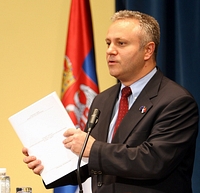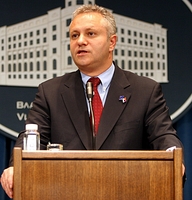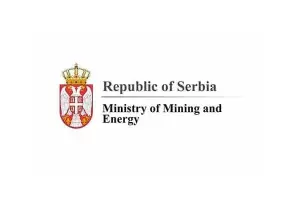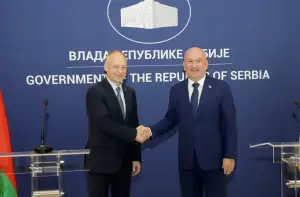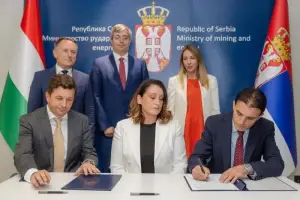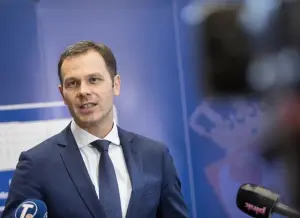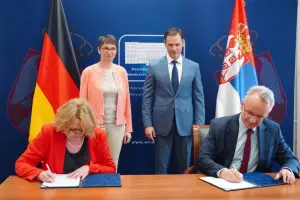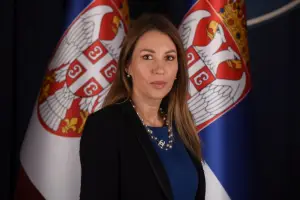Q:
A:
Serbia introduces long-term planning of capital expenditures
Belgrade,
8 September 2006
Serbian Minister of Finance Mladjan Dinkic said that the Serbian government yesterday adopted the Bill on changes and amendments to the Law on budget of the Republic of Serbia for 2006, which has been forwarded to Serbian parliament for immediate adoption and will be examined in a session scheduled for September 12.
Speaking at a press conference at which he presented the budget revision for this year, Dinkic said that Serbia has achieved a budgetary surplus of 32 billion dinars in the period from January to August this year. By the end of the year, this surplus is expected to reach 49 billion dinars, 10 billion dinars more than planned.
In addition, Serbia has pulled in revenues from privatisation worth 100 billion dinars, which will be used for capital expenditures as part of the National Investment Plan and for the reduction of the foreign debt.
The Minister of Finance said that the new segment in this year's revision in relation to previous ones is a threefold increase of capital expenditures, which now account for 12% of the budget. That will surely boost economic development and employment.
Also, for the first time in its budgetary practice, Serbia has introduced long-term planning of capital expenditures and categories of the National Investment Plan. In this way, the government officially adopted the National Investment Plan for 2006/2007, which should be ratified in parliament, Dinkic said.
Dinkic stressed that the financing of the projects of the National Investment Plan will be made by making a selection between "real" projects and those which in a way represent only a "wish list." That means that all those who use up fund from the National Investment Plan more quickly and efficiently will be given additional funds, while those who fail to use what has been given to them and to launch a project by 2007, will be cancelled.
Dinkic said that privatisation proceeds of 130.8 billion dinars are expected, as well as 6.6 billion dinars in loans that had been withdrawn earlier, before it was known that the sale of Mobi 63 would be successful, so the total surplus of the budget's liquidity is some 153 billion dinars.
Out of these 153 billion dinars, 34.7 billion dinars will be used for payment of the capital amount of the public debt this year, while 7.8 billion dinars will be set aside for loans to encourage economic development (housing loans, loans for financing exports, scholarships etc.), so the state of the republic budget's account at the end of the year will be 110.4 billion dinars, Dinkic said and explained that that sum will be transferred to the next fiscal year.
According to Dinkic, some 1.675 billion is planned to be invested as part of the National Investment Plan by the end of 2007.
In addition, Serbia has pulled in revenues from privatisation worth 100 billion dinars, which will be used for capital expenditures as part of the National Investment Plan and for the reduction of the foreign debt.
The Minister of Finance said that the new segment in this year's revision in relation to previous ones is a threefold increase of capital expenditures, which now account for 12% of the budget. That will surely boost economic development and employment.
Also, for the first time in its budgetary practice, Serbia has introduced long-term planning of capital expenditures and categories of the National Investment Plan. In this way, the government officially adopted the National Investment Plan for 2006/2007, which should be ratified in parliament, Dinkic said.
Dinkic stressed that the financing of the projects of the National Investment Plan will be made by making a selection between "real" projects and those which in a way represent only a "wish list." That means that all those who use up fund from the National Investment Plan more quickly and efficiently will be given additional funds, while those who fail to use what has been given to them and to launch a project by 2007, will be cancelled.
Dinkic said that privatisation proceeds of 130.8 billion dinars are expected, as well as 6.6 billion dinars in loans that had been withdrawn earlier, before it was known that the sale of Mobi 63 would be successful, so the total surplus of the budget's liquidity is some 153 billion dinars.
Out of these 153 billion dinars, 34.7 billion dinars will be used for payment of the capital amount of the public debt this year, while 7.8 billion dinars will be set aside for loans to encourage economic development (housing loans, loans for financing exports, scholarships etc.), so the state of the republic budget's account at the end of the year will be 110.4 billion dinars, Dinkic said and explained that that sum will be transferred to the next fiscal year.
According to Dinkic, some 1.675 billion is planned to be invested as part of the National Investment Plan by the end of 2007.
Apart from realisation of the National Investment Plan, another goal is to reduce foreign debt, Dinkic said and announced plans to cut this debt by between $2.5 billion and $3.5 billion in the next few months.
He said that the National Bank of Serbia (NBS) will return $1 billion to the International Monetary Fund (IMF) next year, which will remove Serbia’s debt burden to the IMF.
Also, $540 million is planned to be returned to the World Bank before due time, Dinkic said, which will make it possible to allocate those funds for capital investments, Dinkic said and recalled that the Paris Club of creditors has been offered $1 billion debt repayment in exchange for investment.
He added that talks with Germany as the biggest creditor have already started, and today first positive signals have arrived. Dinkic also said that negotiations with other creditors of the Paris Club are expected to start.
Dinkic said that Kosovo’s debt amounts to over $1 billion, but he insisted that the debt should be serviced by the authorities that collect revenues on the territory.
According to him, around $3 billion of foreign debt is thus reduced in a relatively short period, while the public and domestic debts will be reduced from 170% of GDP to below 35%, making Serbia’s public debt one of the lowest in Europe.
The Minister of Finance said that the budget revision is based on three major goals which include continuation of accelerated economic growth, employment growth and macroeconomic stability maintenance.
Dinkic also said that the GDP per capita is expected to reach at least $3,500.
Serbia has recorded a budget surplus for the second consecutive year, Dinkic said noting that this year’s surplus is projected at 0.8%.
He also noted that foreign exchange reserves reached a record amount of $10.6 billion, while foreign currency savings are constantly growing.
Dinkic also said that salary growth of 18.3% was recorded in the private sector.
He said that the National Bank of Serbia (NBS) will return $1 billion to the International Monetary Fund (IMF) next year, which will remove Serbia’s debt burden to the IMF.
Also, $540 million is planned to be returned to the World Bank before due time, Dinkic said, which will make it possible to allocate those funds for capital investments, Dinkic said and recalled that the Paris Club of creditors has been offered $1 billion debt repayment in exchange for investment.
He added that talks with Germany as the biggest creditor have already started, and today first positive signals have arrived. Dinkic also said that negotiations with other creditors of the Paris Club are expected to start.
Dinkic said that Kosovo’s debt amounts to over $1 billion, but he insisted that the debt should be serviced by the authorities that collect revenues on the territory.
According to him, around $3 billion of foreign debt is thus reduced in a relatively short period, while the public and domestic debts will be reduced from 170% of GDP to below 35%, making Serbia’s public debt one of the lowest in Europe.
The Minister of Finance said that the budget revision is based on three major goals which include continuation of accelerated economic growth, employment growth and macroeconomic stability maintenance.
Dinkic also said that the GDP per capita is expected to reach at least $3,500.
Serbia has recorded a budget surplus for the second consecutive year, Dinkic said noting that this year’s surplus is projected at 0.8%.
He also noted that foreign exchange reserves reached a record amount of $10.6 billion, while foreign currency savings are constantly growing.
Dinkic also said that salary growth of 18.3% was recorded in the private sector.

